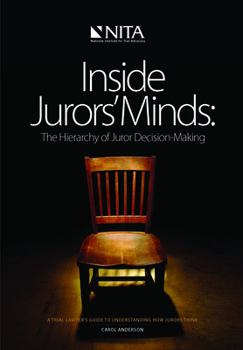Inside Jurors' Minds: The Hierarchy of Juror Decision-Making
This book discusses the conscious and unconscious psychological factors that influence juror decision-making. Jurors inevitably rely on the same "thinking tools" at trial that they use to solve problems and make decisions in their everyday lives, which makes it almost impossible for them to divorce instinct and emotion from decision-making. Their fight-or-flight reflexes are stimulated not only by predators but by information that makes them fear for their personal safety--even if the threatening information is something they merely imagine. Because self-preservation is a primal instinct, jurors tend to unconsciously respond by disregarding or altering the "threatening" evidence. Information that conflicts with their personal beliefs and biases often elicits a similar response. Therefore, what jurors hear and remember about a case will inevitably be a reflection of who they are, what they value, and what their life experiences have been. Because jurors unconsciously weigh information in a hierarchical fashion, the "hierarchy of juror decision-making" can serve as a blueprint for creating strategies to counteract the most common thinking errors that can skew jurors' perceptions of the case. This is a valuable weapon that should be in every trial lawyer's arsenal.
Format:Paperback
Language:English
ISBN:1601561814
ISBN13:9781601561817
Release Date:March 2012
Publisher:Aspen Publishing
Length:186 Pages
Weight:0.45 lbs.
Dimensions:0.4" x 7.0" x 10.0"
Related Subjects
LawCustomer Reviews
0 rating





